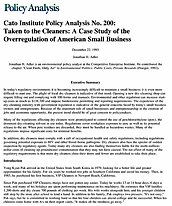Many of the regulations affecting dry cleaners were promulgated to control the use of perchloroethylene (perc), the dominant dry-cleaning solvent in use today. Regulations cover workplace exposure to perc as well as its potential release to the air. When perc residues are discarded, they must be handled as hazardous wastes. Many of the regulations impose significant costs for minimal benefits.
In addition, dry cleaners must comply with a raft of occupational health and safety regulations, including regulations governing potential exposure to HIV and other blood-borne pathogens. Dry cleaners also face the specter of sudden inspection by regulatory agents. Today many dry cleaners are also finding themselves liable for the multi-million- dollar costs of cleaning up groundwater contamination that they may not have caused. The net effect of many of the regulatory requirements is that more dry cleaners close their doors and fewer are established to take their place.


